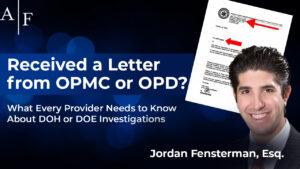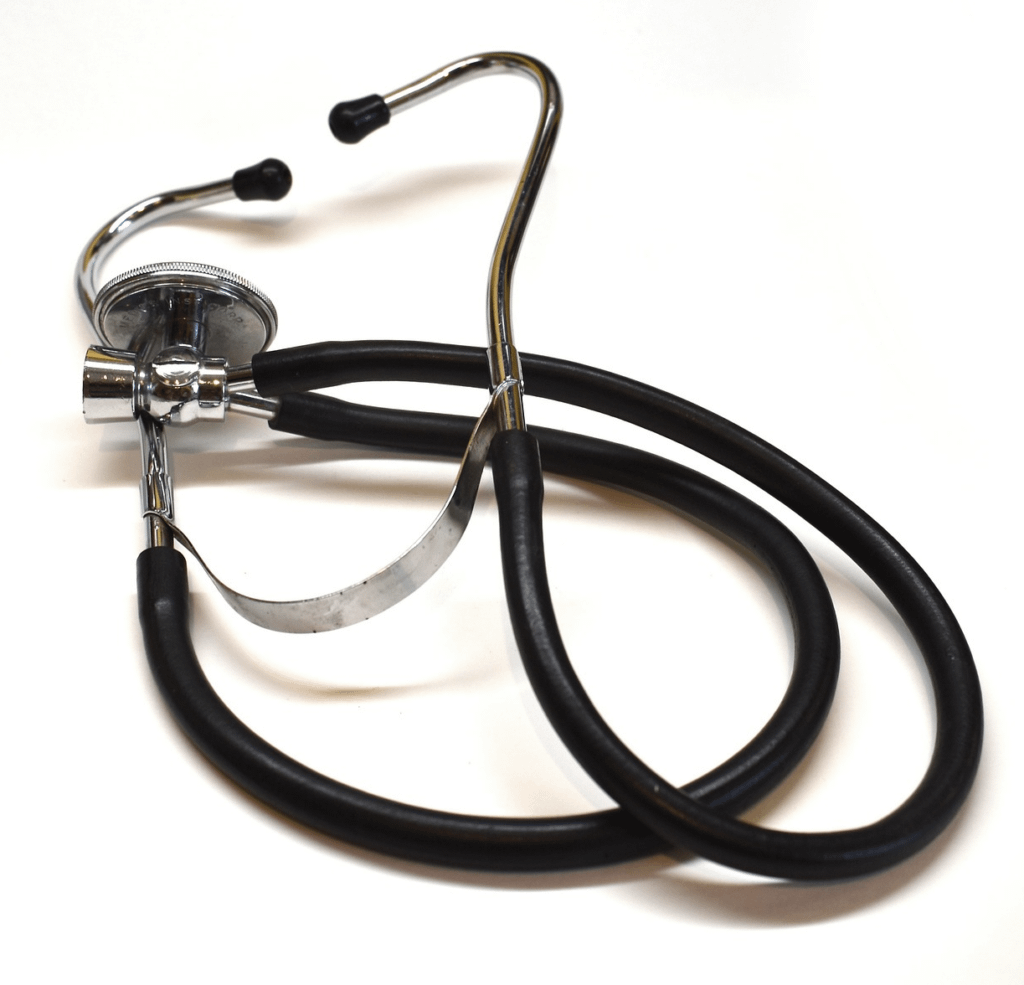By Jordan Fensterman and Michael S. Kelton
You are sitting in your office, secure in the knowledge that you are practicing good medicine, when your receptionist announces that Jane Roe, an investigator from the New York State Department of Health, Office of Professional Medical Conduct (“OPMC”), is on the line. Some of you may wonder what OPMC is. For those of you who know what OPMC is, your heart begins to race, your face becomes flushed, and, with trembling hand, you lift the telephone receiver and answer the call…”hello?”
Ms. Roe states that she is an OPMC investigator and that she is investigating your treatment of patients Alice Abel, Betty Baker and Clara Charles. Ms. Roe requests that you send her copies of each of these patient charts. She tells you that she will be sending you a formal letter, known as a 230 letter, requiring that you supply the medical records within thirty (30) days of your receipt of the letter. Furthermore, she wants to meet with you at a later date to discuss your care and treatment of these three patients.
What you say and do next can profoundly affect the outcome of this investigation. Do you:
- Tell Ms. Roe she can “go to hell” and then hang up the phone;
- Tell Ms. Roe that you have nothing to hide, that you will send her the charts and speak with her freely at any time; or
- Politely thank Ms. Roe for the call, and advise her that your legal representative will get back to her shortly?
If you picked (1), you should, immediately proceed to call a medical school classmate who is a board certified psychiatrist.
If you picked (2), which is, unfortunately, what the overwhelming majority of physicians would do, you may be unwittingly participating in the demise of your practice and career.
If you picked (3), you have taken the first step in the successful resolution of this investigation. Your next step should be to call an attorney who handles medical misconduct investigations.
OPMC Must Investigate Every Complaint
OPMC is the prosecutorial arm of the State Board for Professional Medical Conduct (“BPMC”) within the New York State Department of Health (“NYSDOH”). OPMC has the legal authority to investigate any suspected professional misconduct by physicians, physician assistants and specialist assistants, and must investigate each complaint received regardless of the source. Even an anonymous complaint must be investigated. So, if a complaint has been made, OPMC has no discretion but to investigate.
Typically, the investigation is assigned to one of the investigators at OPMC. The investigator will interview the person or persons making the complaint and then contact you to request copies of the medical charts for the patients involved. For complaints that do not involve patient care the OPMC investigator may contact you before speaking with anyone else. The investigator is authorized by law to obtain and examine records of specific patients in an investigation and you may not raise the issue of patient confidentiality or HIPAA to prevent disclosure of such records for the limited purpose of the investigation. If the investigation involves issues of clinical practice, OPMC medical experts may also review the charts and address those issues. OPMC medical experts will also participate in the interview process where patient care issues are involved.
Not Necessarily Entitled to Random Audits
At some point during the investigation, the investigator may request access to random samples of your patient charts as part of a “comprehensive review” of your office records. Unlike the earlier request for a specific patient chart, OPMC is not entitled to conduct a random audit or comprehensive review of your patient charts unless a justice of the State Supreme Court finds that: there is a reasonable basis for such a review; and there is reasonable cause to believe that the records sought are relevant to an ongoing investigation. Therefore, if the investigator does request a comprehensive review of your office records, talk to your lawyer to determine if OPMC is entitled to one.
The obvious concern with a comprehensive review of your office records is that you may be handing OPMC the rope which it may use to hang you. You should consent to a comprehensive review only after your lawyer has determined that OPMC has the proper foundation for such a review or that objecting to the review would not be in your best interests for other reasons.
In all cases that will be presented to an Investigative Committee (“IC”), the physician must be allowed an opportunity to explain his or her position on the issues being investigated in an interview. The interview is conducted with the OPMC investigator and, in some cases, an OPMC medical consultant. This interview is potentially the most dangerous aspect of the investigation, and should never occur without representation by legal counsel. You are under no obligation to be interviewed by OPMC investigators, and you may choose not to be interviewed. However, if you are properly prepared for an interview it might be your best chance to get the case closed without any adverse consequence on your medical license. While the statute states that the purpose of the interview is to allow the physician an opportunity to provide an “explanation” of the issues under investigation, it has been our experience that during these interviews physicians who are not properly prepared are more likely to provide OPMC with damaging admissions and inconsistent explanations at a time when the nature and scope of the misconduct issues are poorly defined and not ripe for response. The damage done by physicians during these interviews can be insurmountable, and, often, counsel retained after such an interview must devote great efforts to damage control.
There are many types of investigations where we do recommend that our clients seize the opportunity to provide an explanation of the issues, but only after we have learned as much about the issues as can be determined and we are satisfied that the physician will make a reasonable, articulate and logical presentation to investigator/s. Misconduct allegations for which we often encourage our physician clients to be interviewed include quality of care and clinical practice issues and investigations stemming from malpractice settlements. In these cases, most physicians are well equipped to defend the quality of care rendered to a particular patient. For issues involving the prescribing of controlled substances, prescriptions of narcotics and/or pain medications, and the prescribing of testosterone, the cases are highly fact dependent and the decision to present for an interview in our experience is 50-50. Examples of investigations in which we sometimes recommend that our physician clients not be interviewed involve allegations of patient abuse, sexual abuse, drug or alcohol impairment, psychiatric impairment and allegations of misconduct occurring outside the scope of the practice of medicine. It has been our experience that in many of these cases, even an innocent physician will rarely say anything which will impact favorably on the outcome of the investigation. More often, because of nervousness, lack of preparation or an insufficient understanding of the specific nature of the allegations, the physician will say things that will come back to haunt him or her. The decision to be interviewed is never routine; it is made on a case by case basis.
I Don’t Practice Medicine: You Don’t Practice Law
The main reason why physicians get themselves into trouble in OPMC investigations is that they believe that they have done absolutely nothing wrong and are capable of “handling” the situation by themselves, of “explaining” everything in a nice, neat and tidy package. They believe that after the investigator hears their explanation, OPMC will have no choice but to agree that the physician has been unjustly accused. Physicians who think they can talk their way out of these investigations usually are sadly mistaken, and, unfortunately, usually find this out too late. Some OPMC investigators encourage physicians to talk to them without the benefit of counsel, suggesting that the physician has “nothing to worry about” and that the investigator only wants to hear the physician’s side of story, so that the physician can “help himself”. While we have, by and large, found the OPMC investigative staff to conduct themselves in a professional manner, they do encourage physicians to talk to them openly, and rarely advise physicians that they should seek counsel before doing so.
A potential sanction for a finding of professional medical misconduct is the revocation of your license to practice medicine, and the consequent destruction of your career. It is a penalty which can be every bit as serious, and in some instances more serious, than many criminal penalties. For this reason, you should be no more inclined to voluntarily talk to someone investigating you for professional misconduct than you should be to talk to a police detective who is investigating you for the commission of a crime. If you have nothing to hide, and you are truly innocent of the charge, having a lawyer represent you will help assure that finding of innocence. If you do believe you have a problem, having a lawyer can make the difference between a proper resolution and an utter catastrophe.
Conclusion
From the moment you learn that you are the subject of a medical misconduct investigation, from the very first time you are contacted or receive any written communication from any DOH investigative officer, you should seek out and retain an attorney who is well versed in representing physicians in such matters. You should never, under any circumstances, attempt to “represent yourself’ in such an investigation. The most successful results are usually achieved if the investigation is handled properly and professionally from its inception.
Read answers to frequently asked questions regarding OPMC.
Speak with an Attorney at Abrams Fensterman today: 516-328-2300






